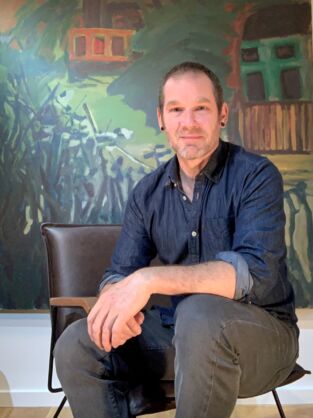‘Do birds piss big?’ and other questions
Laser Quit Smoking Massage: Essays
by Cole Nowicki
Edmonton: Newest Press, 2024
$21.95 / 9781774390917
Reviewed by Brett Josef Grubisic
*

Remember “Death of the Moth”? Published posthumously in 1942, Virginia Woolf’s essay doesn’t quite reach 1200 words.
It might have been the flash nonfiction of its day.
The essay’s five paragraphs capture an ostensibly mundane scene. On a pleasant September morning Woolf watches as a moth struggles to escape windowpane captivity.
The moth tries and tries and tries, then dies.
Woolf empathizes with the moth’s “hard fate” and finds pathos in “his zest in enjoying his meagre opportunities to the full.”
Woolf re-casts a quotidian moment at a window is as the off-balance battle between life and death. And she makes the moth an emblem:
What he could do he did. Watching him, it seemed as if a fibre, very thin but pure, of the enormous energy of the world had been thrust into his frail and diminutive body. As often as he crossed the pane, I could fancy that a thread of vital light became visible. He was little or nothing but life.
Woolf grants the moth an insight that sends chills to human readers: “The moth having righted himself now lay most decently and uncomplainingly composed. O yes, he seemed to say, death is stronger than I am.”
Woolf’s piece sprang to mind as I read Cole Nowicki’s Laser Quit Smoking Massage.
A transplanted rural-raised Albertan who has resided in Vancouver for the better part of a decade, Nowicki expresses a deep, enduring fondness for skateboarding. “A Brief History of People Finding Weird Shit in Their Ears,” “Who Pissed on My Balcony?” and “The Dark Lord of Vancouver Karaoke” testify to his gift for essay titles that catch the eye.
At a glance or two, Woolf and Nowicki appear to share little in common.
Essaying, sure, there’s that; and with it, the trait of observation and contemplation, and transforming all that quiet mental work into public words, sentences, and paragraphs.
There’s brevity too. Woolf balanced the occasionally prolix essay with numerous snack-sized ones like “Moth.” The twenty-five essays of Laser Quit Smoking Massage, Nowicki’s first book, end on page 128. (The average is 5.12 pages, in case you need an assist.)
Those similarities aside, the two share an attraction for the everyday and, more particularly, using that foundation as the basis for larger topics.
Woolf ponders mortality via an ordinary moth; on his wanderings in rural Alberta and urban British Columbia, Nowicki—admittedly, quirky and funny and cynical and angry in ways Woolf never seems—examines the outside world and himself through weird little incidents in his daily life.
“Instances of Birds in Peril” serves as a clear illustration of the author’s approach. Divided into three sections, the essay recounts encounters where the author witnesses a seagull choking on “geometric barnacle,” a starfish. Astonished and soon eager to help, Nowicki also seeks (jokingly) to draw meaning of the incident—as an allegory of student loan debt, say, or “a comment on the strangling constraints of capitalism.”
“Dude, I just want to help,” he tells the bird, and adds:
That’s why I started going to a therapist. I was becoming so emotionally, I don’t know, alone. Unable to communicate what I needed. Like, I’d get into an argument with my girlfriend and instead of trying to empathize with why she was upset and look within myself and try to figure out why I was feeling a certain way and try to untangle the mess of emotion, I’d just internalize that anger and confusion I was carrying.
Via amusing mini-narratives of birds choking, Nowicki slyly inserts a serious and entirely different topic.

In “Smooth Black Marble” Nowicki recalls a bus ride to Lac La Biche, his hometown and “a community that isn’t notable for anything.”
Pensive about his grandfather’s impending interment ceremony and remarking on paying “a mortgage worth of rent on a Vancouver bachelor suite,” Nowicki’s thoughts are drawn to his experiences as a committed skateboarder. “I first gave into skateboarding,” he writes, “letting it become not so much a pastime as a loving, vindictive, all-consuming jinn.” The jinn taught Nowicki about inhabiting a “body containing a life that’s fared worse than a scraped knee” and, as it turned out, grief.
Similarly light in tone, “Things You Can Now Shoot Lasers At” splices errant thoughts on lasers—from tooth whitening and detecting shifts of gravitational waves to “Whatever immediately comes to mind whenever the subject of lasers arises are Stormtroopers”—with family news about his father’s enlarged prostate and, potentially, cancer.
As with Woolf, death isn’t an uncommon theme in Nowicki’s work. It’s there, in varying intensities, in “Send Flowers,” “Misadventure, Probably Drowning,” and “Ray Liotta.”
As he reflects of changes wrought by capitalism in the title essay, his fondness for Oblique Strategies (ie, “A card-based method for promoting creativity… each card offers a challenging constraint intended to help artists break creative blocks by encouraging lateral thinking”) in “My Personal Medium, Brian Eno,” and the humour of neurotic worrying in “A Brief History of People Finding Weird Shit in Their Ears,” Nowicki mixes tones and topics, the lighthearted with the heavyweight, the personal with the political.
Elsewhere, in lifestyle journalist mode, Nowicki covers curiosities, including visitors to Vancouver’s Bloedel Conservatory—in a queue to smell the corpse flower, a “rare Indonesian plant that smells like dead shit”—and Arcanabyss Corvgoth, a countertenor who sings heavy metal karaoke.
Essays touch on Nowicki as he plays Age of Empire II (“the popular sequel to the iconic, historical, real-time strategy video game Age of Empires”), meditates on Untitled (Poodle), Gisele Amantea’s seven-foot aluminum sculpture—and an example of “most city-sanctioned public art, where a work’s aesthetic value is tied to how broad and bland its appeal is, lest it offends the sensibility of the passerby, but more importantly, the property owner”—and the owner of Gail.com. “Amazing Facts About Camels” crackles with cutting and smile-inducing insights into being a job-seeking writer… er, a content producer.
Nowicki roves, exploring family history, home businesses, neighbourhoods, and a cold case; and, in “How To Forget” he offers a how-to list of ten.
As for “Who Pissed On My Balcony?,” which includes the eternal (Googled) question, “Do squirrels piss big?,” its midpoint suggests a detective truly dedicated to solving a peculiar mystery inside his own residence: “I open the sliding door and did what any reasonably curious person would be: I got on my hands and knees and smelt the frozen piss.” As with the other essays, Nowicki proceeds along with a singular logic—amusing, insightful, and committed to uncovering truths, not matter how trivial or odd.
*

My Two-Faced Luck, the fifth novel by Salt Spring Islander Brett Josef Grubisic, published in 2021 with Now or Never Publishing, is reviewed here by Geoffrey Morrison. A previous novel, Oldness; or, the Last-Ditch Efforts of Marcus O (2018), was reviewed by Dustin Cole. [Editor’s note: Brett Josef Grubisic has reviewed books by Tania De Rozario, John Metcalf (ed.), Brandon Reid, Beatrice Mosionier, Hazel Jane Plante, Sam Wiebe, Joseph Kakwinokanasum, Chelene Knight, Lyndsie Bourgon, Gurjinder Basran, and Don LePan for BCR.]
*
The British Columbia Review
Interim Editors, 2023-25: Trevor Marc Hughes (nonfiction), Brett Josef Grubisic (fiction)
Publisher: Richard Mackie
Formerly The Ormsby Review, The British Columbia Review is an on-line book review and journal service for BC writers and readers. The Advisory Board now consists of Jean Barman, Wade Davis, Robin Fisher, Barry Gough, Hugh Johnston, Kathy Mezei, Patricia Roy, Maria Tippett, and Graeme Wynn. Provincial Government Patron (since September 2018): Creative BC. Honorary Patron: Yosef Wosk. Scholarly Patron: SFU Graduate Liberal Studies. The British Columbia Review was founded in 2016 by Richard Mackie and Alan Twigg.
“Only connect.” – E.M. Forster